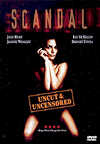Scandal (1989)
Anchor Bay Entertainment
Cast: Joanne Whalley Kilmer, Bridget Fonda, John Hurt, Ian McKellen
Extras: Theatrical Trailer
Rating:
America’s most recent brush with politics and heavy petting notwithstanding, sex scandals have been around as long as men have ruled and women have allowed them to. The Profumo sex scandal of the 1960’s rocked England and helped bring down the then ruling Conservative Party. As dramatized in Miramax’s 1989 film "Scandal" and now with Anchor Bay Entertainment’s stunning new DVD rendition, the story echoes all too well the proverb "politics makes strange bedfellows."
Joanne Whalley Kilmer stars as Christine Keeler, an 18-year-old burlesque dancer. Caught in the orbit of Dr. Stephen Ward (John Hurt), osteopath and panderer to London’s elite, Christine encounters the sexual hypocrisy that has always been part of British society.
Ward grooms prospective lasses for participation in upper-crust orgies, making him a welcome confidant amongst the prurient and jaded pseudo-aristocracy. Along the way, Christine befriends Mandy Rice Davies (Bridget Fonda), 16 years old and full of ambition. Just as Ward adopts Christine, she mentors Mandy through a twisted labyrinth of "knocking clubs" (I will leave it for the film to explain the phrase) and respectable men doing extremely unrespectable things. Christine’s charms eventually catch the wandering eyes of both John Profumo (Ian McKellen), Minister of War, as well as Eugene Ivanov (Jeroen Krabbe), Soviet liaison to Britain. Soon, evening trysts and shared intimacies blossom between the trio. Once the press exposes Christine’s sexual escapades, implicating both a high ranking British officer and a Russian official, matters of moral turpitude give way to threats of national security. Facing a merciless media and the wrath of a duped public awoken to the truth, each character comes to grips with illusions shattered and futures altered.
"Scandal" shines with a remarkable evocation of a London both seamy and exciting. The opening credits evokes the new found optimism of the British middle class, showing newsreel footage of a Britain reborn from the rubble of World War II. However, the film has its peccadilloes. Specifically, the direction by Michael Caton Jones mutes whatever lurid value the material possesses. There’s nothing here that’s shocking. There are plenty of naked bodies at the appropriate moments, but a kind of stuffiness permeates the narrative. Far too much time is spent on watching Christine and Mandy primp or hearing characters saying "Wet your lips" or wading through seemingly umpteen slo-mo shots of Keeler dressing or undressing. Stir in a maddeningly deliberate tempo, and the cumulative effect is of a weird hybrid between "Masterpiece Theater" and a Bangles music video.
The performances are the main attraction here. Kilmer projects a little girl lost vulnerability, even when romping around nude or performing an impromptu fan dance with palm fronds. Hurt anchors the film as a man caught in what was to be the last gasp of British male imperialism. (For kicks, a good companion film to this would be 1966’s "Alfie" with Michael Caine as a London rake facing the end of the same era). Hurt’s Ward delights in regaling stories about his sexual experiences (one character calls him a "connoisseur of sin") or licking his chops when getting sexual dirt from Christine. Unfortunately, in moments when Christine wants emotional comfort from Ward, he can only respond with queries about her lover’s attributes. Indeed, the analogies between the events depicted in the film and America’s last flirtation with scandal are scarily similar. In the scene where Profumo addresses Parliament and categorically denies any "improper behavior" with Keeler, I half expected McKellen to thrust his index finger repeatedly as an exclamation to each denial.
Mastered from a virtually perfect source, the 1.85 <$16x9,anamorphic> transfer could not be any smoother. Fleshtones are accurate and stable. The film’s colors, favoring subtle hues as well as diffuse lighting, are accurately represented. Black levels are solid with details that do not get lost in the brighter scenes. With so precise a video image, one could concede that the director’s fascination with the minutiae of painted lips and thick eyelashes served an artistic purpose. I could not detect any compression or digital artifacts.
Originally mixed for analog Dolby Stereo in theaters, Anchor Bay has remixed the soundtrack for 5.1 <$DD,Dolby Digital> playback on DVD, as well as including a 2.0 <$DS,Dolby Surround> track. The 5.1 discrete audio mix serves well the dialogue and intermittent sound effect pans across the front channels. The surround channels infrequently engage, and even then mostly for music fill. The soundtrack is one of the film’s highlights, featuring standards such as Sinatra’s "Witchcraft," Nat King Cole’s "Lazy Days of Summer" and The Shadows’ instrumental "Apache." I found the standard Dolby Surround track much livelier. With some of the music from the front channels spilling into the rear speakers (owing to the matrix surround process), the 2.0 track seemed fuller and definitely more musical.
The only extra provided is a theatrical trailer. The trailer is presented in 1.85 and Dolby Surround. While not exactly complaining, an opportunity might have been missed to present either newsreel footage or actual newspaper clippings from the time to give a sort of comparison between the film’s depiction of the events and the then-media’s recounting.
Despite my caveats, "Scandal" rewards with compelling performances and a sharp sense of atmosphere. While a technically exuberant DVD should never be mistaken for good storytelling, I am definitely more forgiving when the presentation is perfect. As always, Anchor Bay’s attention to quality affords us an accomplished movie-only DVD edition of the film. Perhaps in an effort to stave off any future scandals, copies could be distributed to every elected official…with one disc in abstention.







